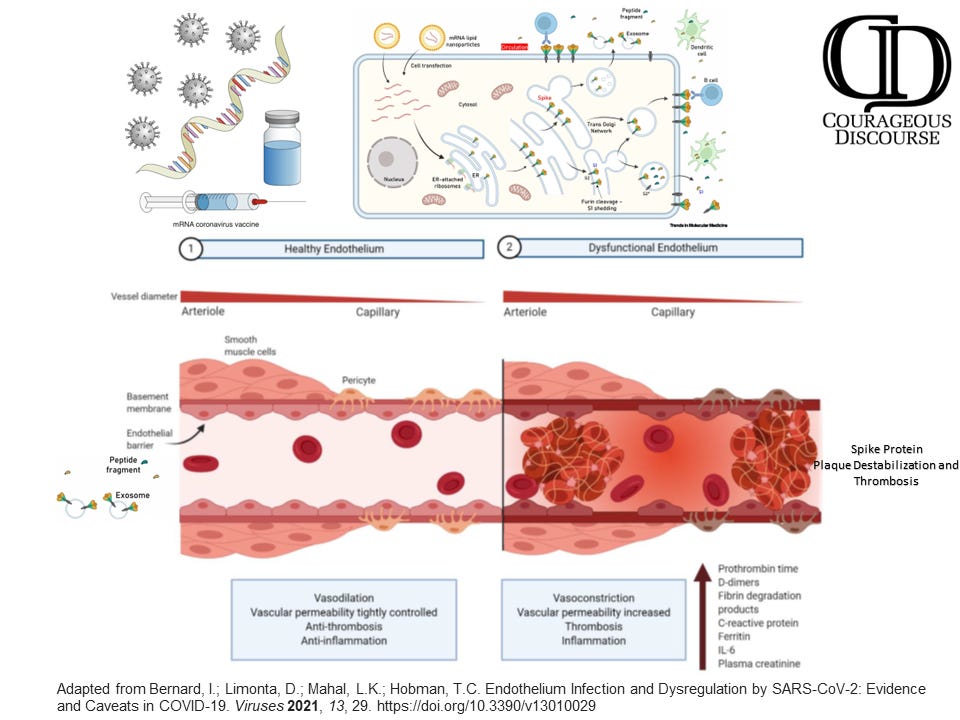Why So Many Heart Attacks, Stenting, and Bypass Surgeries Occur after COVID-19 Vaccination
As a cardiologist, I have received many reports of cardiovascular events (unstable angina, myocardial infarction) occurring after COVID-19 vaccination. Each vignette is different from an explosive fatal heart attack to rapid progression of coronary disease and the need for stenting or bypass surgery. A study by Gundy, who measured multiple biomarkers before and after vaccination was presented as an abstract at the American Heart Association; it predicted heart attacks would happen with COVID-19 vaccination based upon indicators that atherosclerotic plaque within coronary arteries would destabilize with circulatory Spike protein and cytokines.[i] This inflammatory milieu in combination with the thrombogenic nature of the Spike protein is a recipe for fatal and nonfatal heart attacks in patients with existing coronary disease.

This is different from myocarditis which is direct heart inflammation that can occur in younger people with normal coronary arteries. To the casual observer if a man over age 50 years drops dead a few weeks or a few months after a COVID-19 vaccine, it is possible the mechanism of death may have been a fatal myocardial infarction and thrombotic blockage of a coronary artery to heart muscle as depicted in the figure. The only way to tell if the cause of death was coronary heart disease or myocarditis would be to obtain a limited autopsy. Baronti et al reported on four fatal myocardial infarction cases occurring shortly after COVID-19 vaccination.[ii] All of the patients underwent autopsies and were found to have predisposing factors to blood clots.
Patients with prior heart attacks, stents, and bypass surgery are at unacceptably high risk for progression of disease after COVID-19 vaccination and despite the fearful fervor of their cardiologists, they should respectfully decline the shots to keep their cardiovascular system safe. COVID-19 is always treatable and so many heart patients have already had the illness so the next episode will be characteristically mild. Because SARS-CoV-2 respiratory illness can trigger cardiovascular events in the months after hospitalization, recovering patients should consider themselves at equal risk to those who have taken the vaccine and report new heart symptoms to their cardiologist.[iii]
Probably the highest risk patients are those who have had severe COVID-19 and have taken multiple injections either before or after the respiratory infection. In these cases, multiply loading the body with long-lasting Spike protein is highly likely to be an ongoing danger to the cardiovascular system and the only way to navigate out of the storm is to decline any further injections and let the body slowly recover.
[i] Gundry SR. Observational Findings of PULS Cardiac Test Findings for Inflammatory Markers in Patients Receiving mRNA Vaccines. 8 Nov 2021https://doi.org/10.1161/circ.144.suppl_1.10712Circulation. 2021;144:A10712
[ii] Baronti A, Gentile F, Manetti AC, Scatena A, Pellegrini S, Pucci A, Franzini M, Castiglione V, Maiese A, Giannoni A, Pistello M, Emdin M, Aquaro GD, Di Paolo M. Myocardial Infarction Following COVID-19 Vaccine Administration: Post Hoc, Ergo Propter Hoc? Viruses. 2022 Jul 27;14(8):1644. doi: 10.3390/v14081644. PMID: 36016266; PMCID: PMC9413746.
[iii] Bernard, I.; Limonta, D.; Mahal, L.K.; Hobman, T.C. Endothelium Infection and Dysregulation by SARS-CoV-2: Evidence and Caveats in COVID-19. Viruses 2021, 13, 29. https://doi.org/10.3390/v13010029
Source – https://petermcculloughmd.substack.com/p/spike-protein-triggers-coronary-plaque
